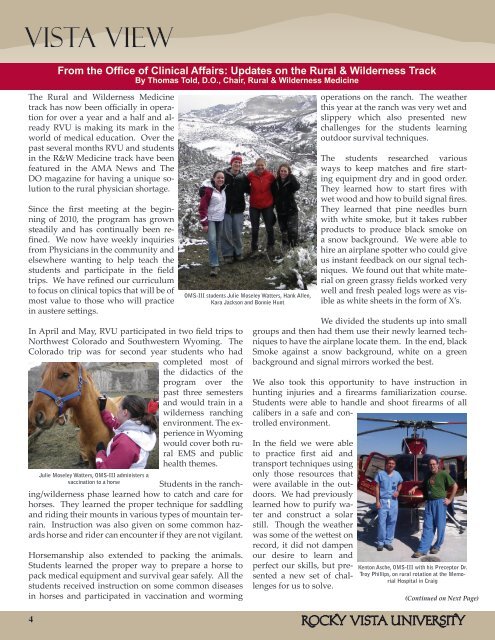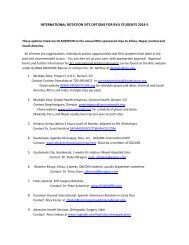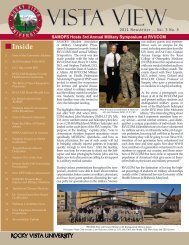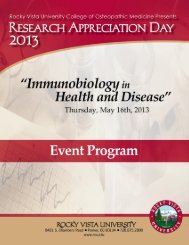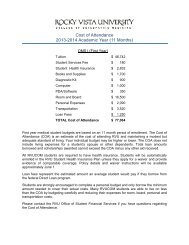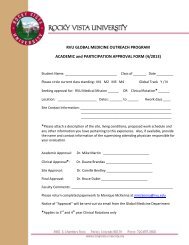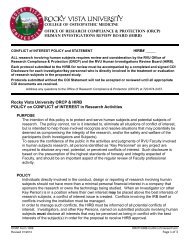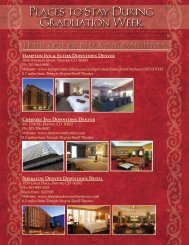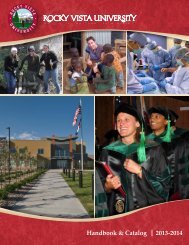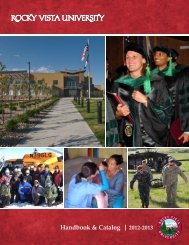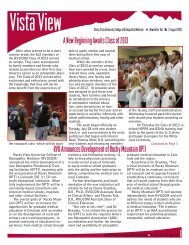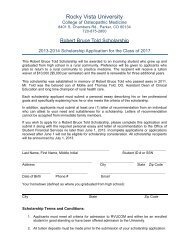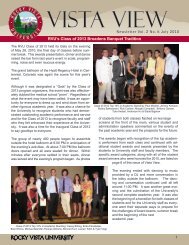Inside - Rocky Vista University
Inside - Rocky Vista University
Inside - Rocky Vista University
You also want an ePaper? Increase the reach of your titles
YUMPU automatically turns print PDFs into web optimized ePapers that Google loves.
<strong>Vista</strong> View<br />
The Rural and Wilderness Medicine<br />
track has now been officially in operation<br />
for over a year and a half and already<br />
RVU is making its mark in the<br />
world of medical education. Over the<br />
past several months RVU and students<br />
in the R&W Medicine track have been<br />
featured in the AMA News and The<br />
DO magazine for having a unique solution<br />
to the rural physician shortage.<br />
Since the first meeting at the beginning<br />
of 2010, the program has grown<br />
steadily and has continually been refined.<br />
We now have weekly inquiries<br />
from Physicians in the community and<br />
elsewhere wanting to help teach the<br />
students and participate in the field<br />
trips. We have refined our curriculum<br />
to focus on clinical topics that will be of<br />
most value to those who will practice<br />
in austere settings.<br />
In April and May, RVU participated in two field trips to<br />
Northwest Colorado and Southwestern Wyoming. The<br />
Colorado trip was for second year students who had<br />
completed most of<br />
the didactics of the<br />
program over the<br />
past three semesters<br />
and would train in a<br />
wilderness ranching<br />
environment. The experience<br />
in Wyoming<br />
would cover both rural<br />
EMS and public<br />
health themes.<br />
4<br />
From the Office of Clinical Affairs: Updates on the Rural & Wilderness Track<br />
By Thomas Told, D.O., Chair, Rural & Wilderness Medicine<br />
Julie Moseley Watters, OMS-III administers a<br />
vaccination to a horse<br />
Students in the ranch-<br />
ing/wilderness phase learned how to catch and care for<br />
horses. They learned the proper technique for saddling<br />
and riding their mounts in various types of mountain terrain.<br />
Instruction was also given on some common hazards<br />
horse and rider can encounter if they are not vigilant.<br />
Horsemanship also extended to packing the animals.<br />
Students learned the proper way to prepare a horse to<br />
pack medical equipment and survival gear safely. All the<br />
students received instruction on some common diseases<br />
in horses and participated in vaccination and worming<br />
OMS-III students Julie Moseley Watters, Hank Allen,<br />
Kara Jackson and Bonnie Hunt<br />
operations on the ranch. The weather<br />
this year at the ranch was very wet and<br />
slippery which also presented new<br />
challenges for the students learning<br />
outdoor survival techniques.<br />
The students researched various<br />
ways to keep matches and fire starting<br />
equipment dry and in good order.<br />
They learned how to start fires with<br />
wet wood and how to build signal fires.<br />
They learned that pine needles burn<br />
with white smoke, but it takes rubber<br />
products to produce black smoke on<br />
a snow background. We were able to<br />
hire an airplane spotter who could give<br />
us instant feedback on our signal techniques.<br />
We found out that white material<br />
on green grassy fields worked very<br />
well and fresh pealed logs were as visible<br />
as white sheets in the form of X’s.<br />
We divided the students up into small<br />
groups and then had them use their newly learned techniques<br />
to have the airplane locate them. In the end, black<br />
Smoke against a snow background, white on a green<br />
background and signal mirrors worked the best.<br />
We also took this opportunity to have instruction in<br />
hunting injuries and a firearms familiarization course.<br />
Students were able to handle and shoot firearms of all<br />
calibers in a safe and controlled<br />
environment.<br />
In the field we were able<br />
to practice first aid and<br />
transport techniques using<br />
only those resources that<br />
were available in the outdoors.<br />
We had previously<br />
learned how to purify water<br />
and construct a solar<br />
still. Though the weather<br />
was some of the wettest on<br />
record, it did not dampen<br />
our desire to learn and<br />
perfect our skills, but presented<br />
a new set of challenges<br />
for us to solve.<br />
Kenton Asche, OMS-III with his Preceptor Dr.<br />
Troy Phillips, on rural rotation at the Memorial<br />
Hospital in Craig<br />
(Continued on Next Page)


